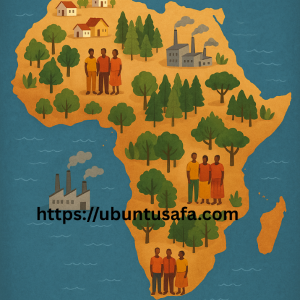"The World Loves African Culture but Not Africans. Why?"

The observation that "The World Loves African Culture but Not Africans" points to a profound and painful paradox rooted in centuries of colonialism, anti-Black racism, and systemic inequalities. It highlights a common phenomenon where elements of a marginalized group's culture are commodified, celebrated, and consumed, while the people who created and live that culture continue to face discrimination, prejudice, and systemic disadvantage.
Here's a breakdown of why this phenomenon occurs:
1. The Legacy of Colonialism and Dehumanization:
-
Historical Othering: For centuries, colonial powers actively dehumanized Africans to justify slavery and exploitation. This narrative portrayed Africans as "savage," "primitive," or "uncivilized," reinforcing a hierarchy where European cultures were superior. This deeply ingrained bias persists.
-
Resource Extraction Mindset: The colonial gaze often viewed Africa primarily as a source of raw materials and cheap labor, rather than as a continent of diverse, complex societies and individuals. This transactional view persists, where the "value" of Africa is often assessed by its resources rather than its people.
-
Erasure of Agency: Colonial education systems and global media often minimized or erased African agency, achievements, and sophisticated pre-colonial societies, further entrenching a narrative of African inferiority.
2. Cultural Appropriation vs. Appreciation:
-
Commodification without Credit or Context: "The world loves African culture" often manifests as cultural appropriation. This involves taking elements of African culture (music, fashion, hairstyles, art, dance, language) out of their original context, stripping them of their meaning, and often profiting from them without acknowledging or benefiting the originators.
-
Examples: Non-Black individuals wearing traditional African hairstyles (like dreadlocks or cornrows) as fashion statements while Black individuals face discrimination for wearing the same styles in professional settings. Fashion brands using African prints without ethical sourcing or fair compensation to African designers.
-
-
Power Imbalance: Cultural appropriation is often a manifestation of a power imbalance, where the dominant culture can "pick and choose" elements of a marginalized culture without understanding or respecting their deeper significance, and without facing the systemic disadvantages associated with being part of that culture.
-
Decontextualization and Trivialization: When African cultural elements are co-opted for commercial gain or fleeting trends, their rich history, spiritual significance, or communal meaning can be trivialized and reduced to mere aesthetics.
3. The "Single Story" and Persistent Stereotypes:
-
Narrative Control: Global media, largely controlled outside Africa, has historically perpetuated a "single story" of Africa dominated by images of poverty, conflict, disease, and corruption. This narrow portrayal overshadows the continent's vibrant cultures, innovations, resilience, and diverse realities.
-
Pity and Fear over Respect: This "single story" evokes pity or fear, making it difficult for many outside the continent to see Africans as multifaceted individuals worthy of equal respect and dignity, even while appreciating certain cultural exports.
-
Disconnect between Culture and People: People might consume Afrobeats or wear Dashikis, but their understanding of or empathy for the socio-economic and political realities faced by actual Africans remains limited, or even negative, due to pervasive stereotypes.
4. Anti-Black Racism and Xenophobia:
-
Systemic Discrimination: Beyond cultural appropriation, systemic anti-Black racism exists globally. People of African descent often face discrimination in housing, employment, education, justice systems, and daily interactions, regardless of their nationality.
-
Xenophobia within and outside Africa: Africans also face xenophobia in various parts of the world, including in some other African countries, highlighting that prejudice isn't limited to non-African populations.
-
Devaluation of Black Lives: The core issue is the devaluation of Black lives and experiences, even as Black culture is celebrated. This often leads to a situation where people are happy to enjoy the cultural products but are unwilling to address the systemic issues that oppress the people who produce them.
5. Lack of Reciprocity and Investment in People:
-
Extraction Continues: While African culture is embraced, there's often a reluctance to invest equitably in African people, institutions, and infrastructure. Financial flows might still prioritize resource extraction or aid, rather than empowering local economies and human development in a truly reciprocal manner.
-
Brain Drain: African talent is often sought after globally, but the conditions and opportunities at home are sometimes not conducive to retaining this talent, further illustrating a pattern of valuing African skills (cultural or otherwise) while not fully investing in the environment for Africans to thrive in Africa.
Bridging the Gap:
Addressing this paradox requires more than just appreciation; it demands action and systemic change:
-
Conscious Consumption: Seeking out and supporting African creators, artists, and businesses directly.
-
Education and Critical Thinking: Actively challenging stereotypes and seeking out diverse narratives about Africa and its people.
-
Advocacy for Justice: Supporting policies and movements that combat anti-Black racism, xenophobia, and systemic inequalities.
-
Fair Representation: Demanding equitable representation of African voices in media, global forums, and decision-making bodies.
-
Ethical Collaboration: Fostering partnerships based on genuine respect, reciprocity, and fair compensation for cultural creators.
The world's enjoyment of African culture is a positive sign of its global appeal. However, true appreciation must extend beyond aesthetics to encompass a genuine respect for the people, their histories, their struggles, and their aspirations, leading to concrete actions that dismantle the structures of prejudice and inequality.
- Questions and Answers
- Opinion
- Motivational and Inspiring Story
- Technology
- Live and Let live
- Focus
- Geopolitics
- Military-Arms/Equipment
- Ασφάλεια
- Economy
- Beasts of Nations
- Machine Tools-The “Mother Industry”
- Art
- Causes
- Crafts
- Dance
- Drinks
- Film/Movie
- Fitness
- Food
- Παιχνίδια
- Gardening
- Health
- Κεντρική Σελίδα
- Literature
- Music
- Networking
- άλλο
- Party
- Religion
- Shopping
- Sports
- Theater
- Health and Wellness
- News
- Culture

